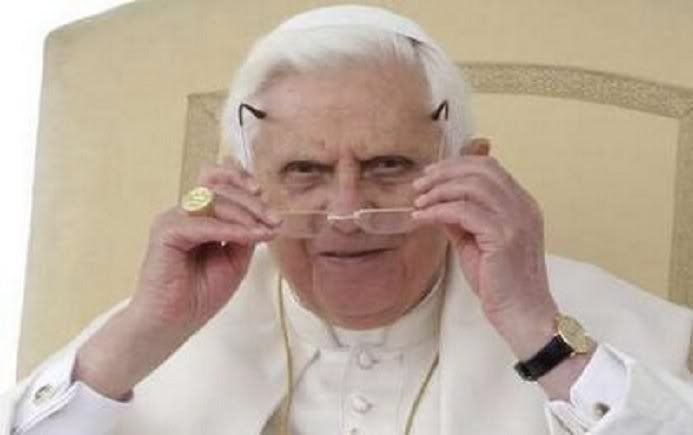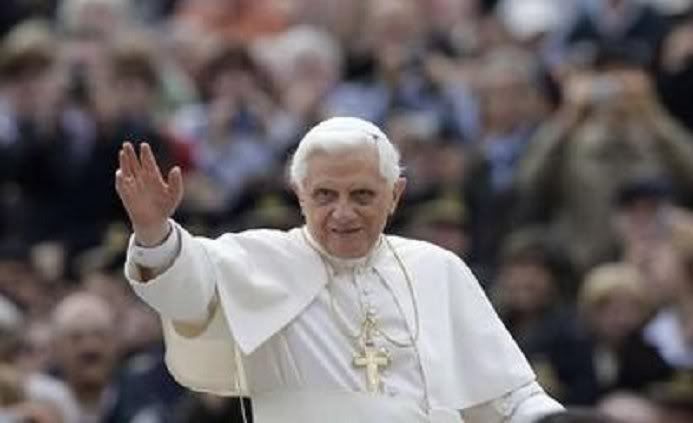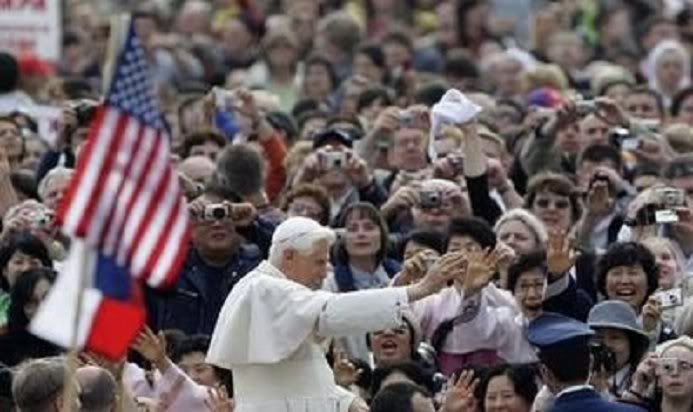 It is Wedesday so that means it is Pope Wednesday Audience time again. Thanks again to the Ratzinger Forum for the pics as well as the translation from today's audience. The Pope is truckin on through his series on the Fathers of the Church. Today Pope Benedict Talks On Benedict!!! I thinkwe get insight here as to why Pope Benedict again chose his name. Notice he hits on the Europe and it s future and ties it to St Benedict.
It is Wedesday so that means it is Pope Wednesday Audience time again. Thanks again to the Ratzinger Forum for the pics as well as the translation from today's audience. The Pope is truckin on through his series on the Fathers of the Church. Today Pope Benedict Talks On Benedict!!! I thinkwe get insight here as to why Pope Benedict again chose his name. Notice he hits on the Europe and it s future and ties it to St Benedict.
Dear brothers and sisters,
I wish to speak today about St. Benedict, founder of Western monasticism, and also the Patron of my pontificate. I will begin with a statement by St. Gregory the Great, who wrote of St. Benedict: "The man of God who shone on this earth with so many miracles does not shine any less for the eloquence with which he knew how to present his teaching" (Dial. II, 36). The great Pope wrote these words in 592.
The sainted monk had died some 50 years earlier and was still alive in the memory of the faithful, above all, in the flourishing religious Order that he established. St. Benedict of Norcia, with his life and his work, has exercised a fundamental influence on the development of European civilization and culture. The most important source about his life is the second book of Dialogues by St. Gregory the Great.
It is not a biography in the classical sense. According to the idea of his times, the great Pope wanted to illustrate, through the concrete example of a person - of St. Benedict's, precisely - the ascent on the slope of meditation. Thus, he gave us a model of human life as an ascent towards the peak of perfection. St. Gregory the Great also recounts, in this book of Dialogues, many miracles performed by the saint. Even in this, he did not simply want to narrate something wondrous, but to show how God - by admonishing, aiding and even punishing man - intervenes in the concrete situations of human life. He wanted to show that God is not a remote hypothesis situated at the origins of the world but that he is present in the life of man, of every man. This perspective taken by the 'biographer' can also be explained in the general context of Pope Gregory's time: on the cusp of the fifth adn 6th centuries, the world was involved in a tremendous crisis of values and institutions caused by the fall of the Roman Empire, the invasion of new peoples and the decadence of customs.
This perspective taken by the 'biographer' can also be explained in the general context of Pope Gregory's time: on the cusp of the fifth adn 6th centuries, the world was involved in a tremendous crisis of values and institutions caused by the fall of the Roman Empire, the invasion of new peoples and the decadence of customs.
By presenting St. Benedict as a 'luminous star', Gregory wished to show - in that grave situation, right here in the city of Rome - a way out of the 'dark night of history' (cfr John Paul II, Teachings, II/1, 1979, p. 1158). In fact, the work of St. Benedict, particularly his Rule, proved to be the bearer of an authentic spiritual ferment, which, in the course of centuries - far beyond the confines of his native land and his time - changed the face of Europe, by inspiring, after the collapse of the political unity created by the Roman Empire, a new spiritual and cultural unity: that of the Christian faith shared by the peoples of the continent. That is exactly how the reality we call Europe came into being.
St. Benedict is thought to have been born around 480, and according to St. Gregory, he came "ex provincia Nursiae" – out of the region of Nursia. His well-to-do parents sent him to Rome to be educated. St. Gregory points out quite credibly that the young Benedict found the lifestyle of many of his schoolmates distasteful - they lived dissolutely, and he did not wish to make the same mistakes. He wanted 'to please God only': "soli Deo placere desiderans" (II Dial., Prol 1). Therefore, before he could complete his studies, Benedict left Rome and retreated to the solitude of the mountains east of the city. After first staying in a village called Effide (today Affile), where he was associated for some time weith a 'religious community' of monks, he became a hermit in nearby Subiaco
 He lived there for three years competely alone in a cave, which since the High Middle Ages, has been the heart of the Benedictine monastery called Sacro Speco. Benedict's time in Subiaco, a time of solitude with God, was for him a time of maturation. Here he had to bear and overcome the three basic temptations to every human being: the temptation of self-assertion and the desire to place oneself at the center of things; the temptation of the senses; and finally, the temptation of anger and revenge.
He lived there for three years competely alone in a cave, which since the High Middle Ages, has been the heart of the Benedictine monastery called Sacro Speco. Benedict's time in Subiaco, a time of solitude with God, was for him a time of maturation. Here he had to bear and overcome the three basic temptations to every human being: the temptation of self-assertion and the desire to place oneself at the center of things; the temptation of the senses; and finally, the temptation of anger and revenge.
In fact, Benedict was convinced that it was only after having conquered these temptations that he would be able to say anything useful to others who were in need. Thus, with his soul becalmed, he became able to fully control the impulses of the ego to become a man who could create peace around him. It was only then that he decided to found his first monasteries in the Anio valley, near Subiaco.
In 529, Benedict left Subiaco to establish himself in Montecassino. Some have interpreted his move as a flight from the intrigues of an envious local prelate. But this has been shown to be unconvincing since the prelate's sudden death did not cuase Benedict to return (II Dial. 8). In fact, his decision came about because he had entered a new phase of interior maturation and of his monastic experience. According to Gregory the Great, Benedict's transfer from the remote Anio valley to Monte Cassino - a height which dominates the surrounding plains and is visible from afar - had a symbolic nature: that a hidden monastic life has its reasons, but that a monastery also has a public purpose for the life of the Church and of society - it should give visibility to faith as a force of life.
In fact, when, on March 21, 547, Beneict's earthly existence ended, he left - with his Rule and the Benedictine family he founded - a patrimony which has borne fruit throughout the world in the centuries that followed, to the present time. In the entire second book of Dialogs, St. Gregory shows us how the life of St. Benedict was immersed in prayer, the defining foundation of his existence. Without prayer, there is no experience of God. But Benedict's spirituality was not an interiority remote from reality. In the unease and confusion of his time, he lived under the eye of God, and thus, he never lost sight of the duties of daily life and of man with his concrete needs. Seeing God, he understood the reality of man and his mission. In his Rule, he desscribed monastic life as "a school in the service of the Lord" (Prol. 5) and asked his monks "not to place anything ahead of the Work of God" (that is, the Divine Office and the Liturgy of the Hours)(43,3). But he underscored that prayer is, in the first place, an act of listening to God (Prol 9-11), which must then be translated into concrete action.
"The Lord expects us to respond daily with deeds to his holy teachings", he says (Prol. 35). Thus, the life of a monk becomes a fruitful symbiosis between action and contemplation "so that God may be glorified in everything" (57,9). In contrast to facile, egocentric self-realization, which is often exalted today, the first and irrenuciable commitment of a disciple of St. Benedict is the sincere quest for God (58,7) along the humble and obedient way shown by Christ (5,13), to whose love nothing and no one should come ahead (4,21; 72,11), thus becoming, in the service of others, a man of service and peace. In the exercise of obedience as an act of faith inspired by love (5,2), the monk achieves humility (5,1), to which the Rule devotes an entire chapter (7).
In this way, man conforms ever more to Christ and attains true self-realization as a creature in the image and likeness of God. To the obedience of the disciple must correspond the wisdon of the Abbot, who, in the monastery, 'takes the place of Christ' (2,2; 63,13). His figure, described above all in the second chapter of the Rule, with a profile of spiritual beauty and demanding commitment, could be considered a self-portrait of Benedict since, as Gregory the Great writes - "the Saint could not teach what he himself had not lived" (Dial II,6). The Abbot should be a tender father as well as a severe teacher (2,24), a true educator.
Inflexible against vices, he is called above all to imitate the kindness of the Good Shpeherd (27,8), and "to help rather than to dominate" (64,8), "to emphasize more with deeds than with words everything that is good and holy" and to "illustrate the divine commandments with his example" (2,12). In order to be able to decide ressponsibly, the Abbot should himself listen to "the advice of his brothers" (3,2), because "often God reveals the best solution to the youngest" (3,3). This disposition makes a Rule written almost 15 centuries ago surprisingly modern! A man with public responsibility, even in small circles, should always know how to listen and to learn from what he hears.

Benedict describes the Rule as "minimal, intended only as a beginning"(73,8). In fact, it offers instructions useful not only to monks, but to all those who seek a guide in their way towards God. Because of its measured perspective, its humanity and its sober discernment between the essential and the secondary in spiritual life, the Rule has been able to maintain its illuminating power up to our day. Paul VI, proclaiming St. Benedict a Patron of Europe on October 22, 1964, wished thereby t oacknowledge the marvelous work carried out by the Saint through his Rule towards the formation of European civilization and culture.
Europe today - just emerging from a century profoundly wounded by two world wars and the collapse of major ideologies that proved to be tragic utopias - is in search of its identity. To create a new and lasting unity, political, economic and juridical instruments are certainly important, but an ethical and spiritual renewal drawing from the Christian roots of the continent must also be inspired, otherwise Europe cannot be reconstructed.
Without this vital lymph, man remains exposed to the danger of falling to the ancient temptation of self-redemption - a utopia which caused, in various ways during the 20th century, as John Paul II pointed out, "an unprecedented regression in the tormented history of mankind" (Teachings, XIII/1, 1990, p. 58). In seeking true progress, let us heed the Rule of St. Benedict even today as a light for our way. The great monk remains a true teacher in whose school we can learn the art of living true humanism.
Here is how the Holy Father synthesized his catechesis in English:
Dear Brothers and Sisters, Our catechesis today is concerned with Saint Benedict, the Father of Western monasticism. The most important source of information on his life is the Second Book of the Dialogues of Pope Saint Gregory the Great. Writing in a time of turmoil and moral decadence following the fall of the Roman Empire, Pope Gregory believed that the life and Rule of Benedict could be a light leading the people of Europe out of darkness.
Benedict was born in 480 in the region of Nursia. He came to Rome to study but soon left the city so as to live in silence and to please God alone. He spent some time in a religious community before becoming a hermit in a cave. After struggling victoriously against the fundamental human temptations of pride, sensuality and anger, he decided to found a monastery at Subiaco. Years later he established a new community on a mountain, Montecassino, to symbolize the public role of a monastery called to be a light shining for the good of the Church and society.
Indeed, when he died in 547 Saint Benedict left behind a thriving spiritual family and a Rule, which invites us to search for God in prayer, obedience and humility while attending faithfully to daily duties and to those in need. In 1964 Pope Paul VI proclaimed Saint Benedict Patron of Europe recognizing the role that his teaching and his disciples had played in shaping Europe’s spiritual life and culture.
Let us continue to pray that Europe’s new unity may be enlightened and nourished by a religious and moral renewal drawn from its Christian roots. I am happy to greet the English-speaking visitors present at today’s Audience, including the pilgrims from the Archdiocese of Manila, and the many groups from England and the United States. May your lives, after the example of Saint Benedict, be lived in humility, prayer, obedience to God and faithful service to your neighbour. May the Lord bless you and your families!















No comments:
Post a Comment